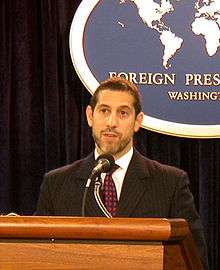Bruce Hoffman
| Bruce Hoffman | |
|---|---|
 Dr. Bruce Hoffman, Director, RAND Washington Office at Washington Foreign Press Center briefing on "The Status of the War on Terrorism." | |
| Born | 1954 (age 63–64) |
| Alma mater |
Oxford University(D.Phil., B.Phil.) Connecticut College(A.B.) |
| Institutions |
Georgetown University University of St Andrews RAND Corporation |
Main interests | International relations theory |
Bruce Hoffman (born 1954) is a political analyst specializing in the study of terrorism and counterterrorism and insurgency and counter-insurgency. He is a tenured professor at Georgetown University's Edmund A. Walsh School of Foreign Service, where between 2010 and 2017 he was the director of the Center for Security Studies and director of the security studies program. Hoffman is the second longest-serving director in the center and program's three-decade history. He is also visiting Professor of Terrorism Studies at St Andrews University, Scotland. [1]
Career
Hoffman began studying these subjects while a graduate student at Oxford University from 1976 to 1981. In 1981, Hoffman joined the RAND Corporation in Santa Monica, California, US. He left RAND in 1994 when he was appointed senior lecturer (and, subsequently, reader) in international relations at the University of St Andrews. In 1994, he co-founded (with Professor Paul Wilkinson) and was the first director of the Centre for the Study of Terrorism and Political Violence (CSTPV) at St Andrews, where he was also chairman of the Department of International Relations (1994–1998).[2][3] Hoffman left St Andrews at the end of 1998 to return RAND as director of RAND's Washington Office (1998–2006), vice president for external affairs at RAND (2001–2004), and acting director of the Center for Middle East Public Policy (2004). He also held the RAND Corporate Chair in Counterterrorism and Counterinsurgency (2006–2006). Hoffman served as a commissioner on the 9/11 Review Commission, which examined the Federal Bureau of Investigation's (FBI) ability to counter terrorism, radicalization and cyber crime. The Commission's report was released on March 25, 2015. He was scholar-in-residence for Counterterrorism at the Central Intelligence Agency between 2004 and 2006; an adviser on counterterrorism to the Office of National Security Affairs, Coalition Provisional Authority, Baghdad, Iraq in 2004, and from 2004 to 2005 an adviser on counterinsurgency to the Strategy, Plans, and Analysis Office at Multi-National Forces-Iraq Headquarters, Baghdad. Hoffman was also an adviser to the Iraq Study Group (2006). [4] He is currently Shelby Cullom and Kathryn W. Davis Senior Visiting Fellow at the Council on Foreign Relations and was a Visiting Fellow at All Souls College, Oxford University in 2009. Hoffman has been a public policy fellow and a distinguished scholar at the Woodrow Wilson International Center for Scholars in Washington, D.C. and is currently a Global Wilson Fellow. He was also a visiting professor at Rajaratnam School of International Studies, Singapore, where he was the S. Rajaratnam Professor of Strategic Studies for 2009 and the William F. Podlich Distinguished Fellow and visiting professor of government at Claremont McKenna College in 2016. Hoffman has been teaching at the International Institute for Counterterrorism at the Interdisciplinary Center in Herzliya, Israel, since 2006. [5]
Publications
Hoffman's publications include "Holy Terror": The Implications of Terrorism Motivated by a Religious Imperative (1993).[6] The renowned British historian of intelligence, Professor Christopher Andrew, writes in his book, Secret World: A History of Intelligence, that "Bruce Hoffman, the academic terrorism expert who most clearly identified the future threat from Holy Terror, did so largely because he took a much longer-term view than most intelligence agencies."[7] Hoffman's own books include: Inside Terrorism (New York: Columbia University Press, 1998; 2nd expanded and revised edition 2006; 3rd expanded and thoroughly revised edition, September 2017); The Failure of Britain's Military Strategy in Palestine, 1939–1947 (Bar-Ilan, Israel; Bar-Ilan University Press,1983); and, Anonymous Soldiers: The Struggle For Israel, 1917–1947 (New York: Knopf, 2015 and New York: Vintage, 2016). Anonymous Soldiers was awarded the Washington Institute for Near East Studies’ Gold Medal for the best book on Middle Eastern politics, history and society published in 2015 and was also named The Jewish Book of the Year for 2015 by the Jewish National Book Council. Hoffman is the editor-in-chief of the scholarly journal, Studies in Conflict and Terrorism; and, the series editor of Columbia Studies in Terrorism and Irregular Warfare, published by Columbia University Press. He co-edited with Fernando Reinares The Evolution of the Global Terrorist Threat: From 9/11 to Osama bin Laden's Death (New York: Columbia University Press, 2014).
Education
In 1976, Hoffman earned a BA in government and history from Connecticut College. He studied international relations at Oxford University, where he earned a B.Phil. in 1978 and a D.Phil. in 1986.[8]
References
- ↑ https://www.cfr.org/experts/bruce-hoffman
- ↑ staff (23 January 2014). "Professor Bruce Hoffman Joins CSTPV". The Handa Centre for the Study of Terrorism and Political Violence. Retrieved 24 March 2015.
- ↑ Segev, Tom (25 February 2015). "Sunday Book Review: 'Anonymous Soldiers,' by Bruce Hoffman". The New York Times. Retrieved 24 March 2015.
- ↑ https://www.cfr.org/experts/bruce-hoffman
- ↑ https://www.cfr.org/experts/bruce-hoffman
- ↑ Hoffman, Bruce (1993). ""Holy Terror": The Implications of Terrorism Motivated by a Religious Imperative" (PDF). RAND. Retrieved 24 March 2015.
- ↑ Christopher Andrew, "The Secret Word: A History of Intelligence" (London: Allen Lane and New Haven: Yale University Press, 2018), pp. 717-718.
- ↑ "Bruce Hoffman Bio". Georgetown University. Retrieved 24 March 2015.
External links
- Georgetown University. "Bruce Hoffman".
- Appearances on C-SPAN